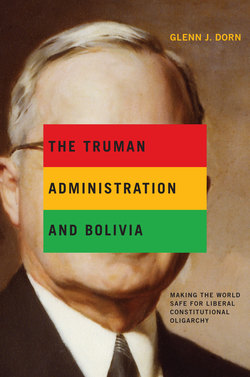The Truman Administration and Bolivia

Реклама. ООО «ЛитРес», ИНН: 7719571260.
Оглавление
Glenn J. Dorn. The Truman Administration and Bolivia
Отрывок из книги
For Cassandra
List of Abbreviations xi
.....
Peñaranda bowed to necessity by opting for virtually total cooperation with Washington. In 1937, “military socialists” had, as part of the post-Chaco wave of nationalism, expropriated Standard Oil’s properties in Bolivia, driving a wedge between the United States and Bolivia. With war looming, U.S. policy makers hoped to unite the hemisphere against the Axis and to secure a reliable source of tin for war industries by working toward rapprochement with Peñaranda’s government. Eager to partake of U.S. economic and military aid, Peñaranda was quick to respond. He welcomed a team led by State Department officer Merwin Bohan to develop a program for economic diversification of the Bolivian economy, agreed to a number of “denazification” measures, and signed a military assistance pact. Most important, he settled with Standard Oil soon after Pearl Harbor and agreed to pay the company $1.5 million for its expropriated properties. He was rewarded with Lend-Lease aid and financial assistance to start implementing the Bohan Mission’s findings. In short, the war brought the two nations into an unprecedented partnership and seemed to offer the promise of future cooperation.37 The only dark cloud on the horizon was the undecided price for Bolivia’s tin.
Peñaranda eventually agreed to sell the nation’s entire tin production to the Allies for a price well below what most Bolivians expected. Even worse, the tin barons, with at least tacit U.S. support, squeezed their labor force to maximize production and profits. The deteriorating working conditions in the mines and the restrictive contracts with the United States, which, nationalists claimed, cost Bolivia as much as $650 million in lost revenues throughout the war, provided easy fodder for dissidents.38 The “unfavorable contracts over raw materials, the commitments to contribute to the democratic cause, the inhuman persecution of Japanese and Germans[, who had] settled for many years in the country”—persecution undertaken at the behest of the United States—brought nothing but “pain, grieving, and impoverishment” to the Bolivian people. As the foremost standard-bearers of this critique, which melded xenophobia, outrage toward Peñaranda’s subjugation of the national interest, and traditional antirosquismo, Paz Estenssoro and the MNR rapidly emerged as the foremost opposition group.39
.....